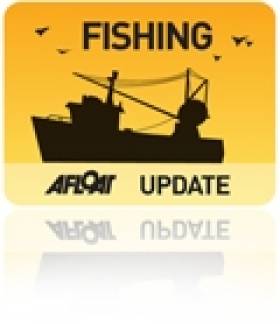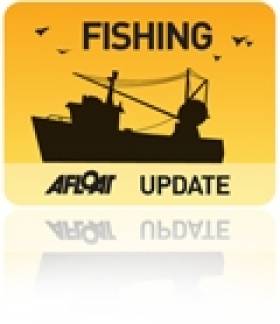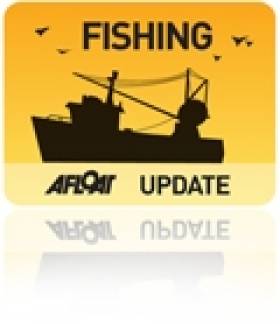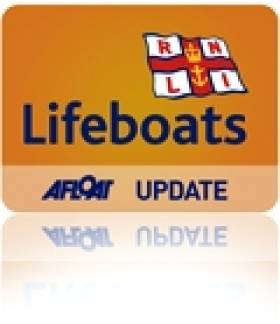Displaying items by tag: Fishing
Connick Opens Fish Ireland 2010
Sean Connick TD, Minister of State at the Department of Agriculture, Fisheries and Food, today opened Fish Ireland 2010, Ireland’s trade exhibition for the Irish Fishing Industry. Minister Connick also took the opportunity to meet with representatives of the Killybegs Fisherman’s Organisation and the Donegal fish processing companies to continue the ongoing dialogue on issues facing the fishing sector.
The Minister welcomed the invitation to open the exhibition and noted the appropriateness of holding such an event in Killybegs, one of the most modern fishing ports in the EU. On the exhibition which was organised by the Marine Times the Minister said “Events like this allow fishermen and their suppliers discuss the ever changing needs of the industry and prepare for future requirements”. He went on to say that further measures for sustainable fishing practices on the horizon required that “a more flexible approach will have to be adopted, not only by the fishermen but also by the suppliers of the fishing industry”.
In his address Minister Connick touched on a number of topics including the reform of the Common Fisheries Policy, however, his central message revolved around innovation, differentiation of product and maximising returns. He complimented the fishermen and processors in Killybegs for being “To the forefront in innovation, diversification and forward thinking, playing a large part in driving the further development of pelagic markets, particularly in Russia, and the move towards more processing of Blue Whiting for human consumption”.
He also referred to the foresight of the KFO in funding research into the sustainability of a new boar fish fishery saying “This is an exciting departure and one which shows how serious we in Ireland are about conducting our business in a proper and prudent manner mindful of the finite nature of the resource we harvest”. The Minister emphasised the integral part the seafood industry will have to play in Ireland’s economic recovery, saying “We have a high quality raw material on our doorstep, we have a flexible and innovative industry and the demand for our product remains strong. What we must do is continue to innovate, differentiate Irish seafood and maximise our returns by increasing value added”.
He went on to encourage processors to avail of the services BIM’s Seafood Development Centre. Saying “This world class facility can only benefit companies who want to be progressive and grow their markets. It is already assisting 60 Irish seafood companies to differentiate and further refine their products since its launch in October last year and is well on its way to delivering its ambitious target of €100 million in additional value added sales over the next five years”.
Spanish Fisherman Fined for Illegal Fishing Activity
The Master of a Spanish fishing vessel, the ‘Nuevo Murgados ‘ was fined and had his catch and gear confiscated by the State in a case brought before Cork Circuit Court on Tuesday 15th June 2010. Fines of €20,000 in total were imposed and forfeiture for the catch and gear amounted to €41,000. The Judge also imposed an award of €5,000 towards costs of the case. The case was the subject of a trial brought before Cork Circuit Court between the 29th of April to the 5th May 2010 whereby the defence sought to challenge the use of the new Omega Gauge in the measurement of nets.
The ‘Nuevo Murgados’ was boarded by the Naval Service off the West Coast of Ireland on the 28th September 2009, and was subsequently inspected by Sea-Fisheries Protection Officers (SFPOs). During the inspection, two nets were measured by the SFPOs using the Omega Gauge; the results were that nets were found to be 93.8mm and 77mm respectively which contravened EU regulation. The Master was charged with two offences including; logbook infringements -operating a net of less than 100mm whereas 100mm was recorded in the EU Logbook and retaining in excess of 20% Hake while operating a net between 55mm and 99mm.
On the 1st September 2009 the Omega Gauge was introduced as the definitive means for the measurement of the mesh size of fishing vessels operating in community waters. The Omega Gauge applies a predetermined force and calculates the average for a series of measurements ensuring consistency in measurement, whereas the preceding gauge required the inspector to apply a manual force.
Peter Whelan, Chairman of the SFPA said: “The defence in this case challenged the Omega Gauge, and in this context securing a conviction was significant. The use of the Omega Gauge has been the subject of some criticism however the outcome of this case proves the viability of the system. The Omega Gauge will provide a consistent reliable measurement for fishermen and should provide assurance for legitimate operators that the same result will be produced whenever their gear is measured. The Omega Gauge improves the methodology for mesh size measurement which will contribute to better implementation of technical conservation measures and the effectiveness of fishery management overall.”
New Safety Scheme for Irish Fishermen
Minister of State at the Department of Agriculture, Fisheries and Food, Sean Connick, T.D. has formally launched a new programme of financial support to assist fishermen upgrade critical life-saving, fire-fighting, and other safety equipment on-board their fishing boats.
The delivery of the scheme is projected to provide up to €3 million of funding over the next five years, subject to budgetary provisions. The scheme will be administered by Bord Iascaigh Mhara (BIM), the Irish Sea Fisheries Board. In addition to fishing boats, the scheme also provides for the purchase of 'on-board' safety equipment for registered vessels used for sea-angling and other forms of marine tourism.
Speaking at the launch in Wexford, Minister Connick explained the importance of this timely scheme. "I am only too aware of the pain and suffering that is caused to the families and our coastal communities as a result of accidents at sea. We were unfortunately reminded of the dangers of the sea again this weekend with the news of the accident off Helvic Head yesterday. It is imperative that we do all in our power to prevent further accidents and especially casualties and one of these preventative measures includes ensuring our fishing fleet is operating to the best safety standards. This new scheme will enable up to 800 vessels to modernise their onboard safety equipment to further protect fishing crew. However, it is not enough to have a modern vessel, all skippers and crew must complete basic safety training and I would encourage all fishermen, who have not already done so, to contact BIM to complete their safety training without delay".
The Fleet Safety Scheme is an integral part of the 2007-2013 National Development Plan - Sea Fisheries Development Programme and is intended to further improve the overall safety standards onboard Irish fishing vessels. Under the previous Fishing Fleet Development Measure 2000-2006, 1,234 vessels availed of assistance under the Fleet Safety scheme and received grant aid of €2.23 million in support of €5.57 million investment. The current scheme which will run from 2010-2015 will provide grant aid of up to 40% for the purchase and installation of safety items including statutory lifesaving, fire-fighting, navigation and communication equipment.
Rose McHugh, Chair of BIM in welcoming the Minister's announcement said "On behalf of BIM, I would like to thank Minister Connick for his support and approval of this important scheme. Safety is paramount for the Irish fishing industry and this package will help fishermen in these difficult times to modernise their vessels in line with safety standards which will ultimately help to save lives at sea".
Applications and details on the Fleet Safety Scheme and the three other schemes under the Sea Fisheries Development Programme are available from www.bim.ie
Commission Launches Discussion on 2011 catch levels
Catch limits for the Baltic Sea, the Black Sea and the North-East Atlantic (including the North Sea) are set annually by fisheries ministers following proposals by the Commission in the autumn. Quotas for deep-sea species are set every two years.
The Commissioner would like to see a tougher method applied to setting quotas and days at sea, in order to meet international standards. While launching the report the Mrs Damanaki said, "I want to be clear that the quota levels set must respect all the European Union's commitments to sustainability, our commitments to nearby States, and the commitments we have made under long-term plans."
EU Member States agreed in 2002 that fish stocks should only be exploited to their maximum sustainable level. This policy is having results with 11 stocks meeting this target.
Annually, the Commission drafts a report on fishing stocks to explain to the fishing industry the rules that will be used to set quotas. Common rules ensure that all fleets are treated equally and fairly. The EU fisheries policy must be guided by the following parameters; environmental sustainability; stability in quotas when possible; respect for international commitments; the reduction in over-fishing and the rebuilding of stocks; usage of international consensus scientific advice. Overall the Commission will practice caution when there is uncertainty.
The Commission relies on scientific advice from two international expert committees when proposing fish quotas: the International Council for the Exploration of the Sea, based in Copenhagen and the Scientific, Technical and Economic Committee for Fisheries. This advice will be available in June/July.
The Commission will now send the report to the fishing industry and Member State Governments for consultation and examination. After taking account of their responses a final strategy proposal will be made.
Lifeboats Rescue Man Overboard off Antrim Coast
On a busy Sunday for RNLI lifeboat crews off the north Antrim Coast both Red Bay and Portrush RNLI lifeboat crews launched at 9.22am this morning to reports of a vessel in difficulty with two people onboard off Sheep Island at Ballintoy.
The 16 foot fishing boat got into difficulties when an anchor went down and a crewmember from the vessel bent over the bow of the boat in an attempt to retrieve it. He was caught by a wave and pulled into the freezing water.
When the lifeboats arrived on scene the man had been recovered onto the vessel by the other crewmember. Conditions were poor with a force five in evidence and a big swell. Both men were suffering from the cold and were in shock. The vessel was clearly in great difficulty and the two men were transferred onboard the Portrush all weather lifeboat while Red Bay RNLI towed the vessel back to land. A waiting ambulance met the casualties at Ballycastle.
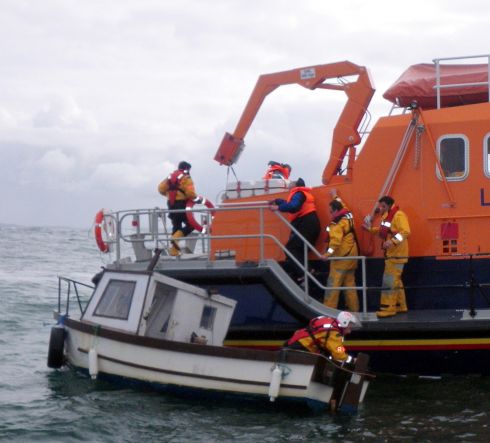
Commenting on the rescue Red Bay RNLI helm Paddy McLaughlin said, “These two men were extremely lucky today. One man had already entered the freezing water before getting back on the boat and they were both in need of medical assistance by the time we had reached them.”
The rescue operation lasted for three hours and was the second major rescue for the RNLI in the area that morning. Portrush RNLI inshore lifeboat crew rescued two men from the sea while their all weather lifeboat assisted Red Bay with the Ballintoy callout.
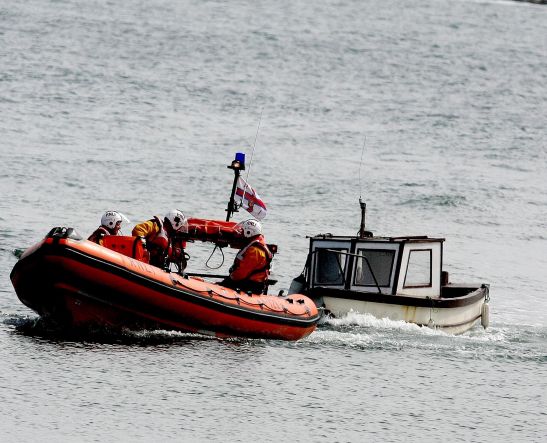
Additional report from MCA:
The emergency 999 call was made at 9.15 this morning alerting the marine emergency service and that the cruiser with two people on board was in extreme difficulty and without power.
The Coastguard immediately relayed a mayday signal into the area to alert other vessels to the on going emergency.
The Portrush and Redbay lifeboats were also asked to launch and a rescue helicopter was initially scrambled from the Royal Naval Air Station at Prestwick, however by this time the man had been recovered to the vessel and it was stood down. His colleagues on board the cabin cruiser indicated that he was very cold but there were no visible injuries and that he was slowly warming up, but they remained without power as a rope had been caught around its propeller and were experiencing very heavy weather. The Portrush all weather lifeboat picked up the man who gone into the water and a colleague and brought them will all speed back to Ballycastle. The Redbay lifeboat is now bringing the vessel under tow back to Ballycastle.
Meanwhile a further call was taken from Portrush promenade where a member of the public had spotted two people in the water shouting for help. Both were drunk and had been caught in the rip tide off West Strand. The Coastguard began broadcasting into the area immediately requesting vessels to go to his assistance and the Portrush inshore lifeboat was on scene very quickly and recovered both people to the lifeboat. An ambulance was requested and the lifeboat was met by the Coleraine Coastguard Rescue Team and paramedics.
Alan Pritchard, Duty Watch Manager at Belfast Coastguard said:
“It is clear that the weather is going to be somewhat rough today with rain forecast. We are asking the boating public and those who will be visiting the coastline to take that extra bit of care. Make sure you have some communication with you, and of course if you go afloat wear a lifejacket! The two men who went into the water whilst under the influence of drink are very poorly in hospital, and we cannot stress enough how dangerous it is going into the sea whilst drinking.”


























